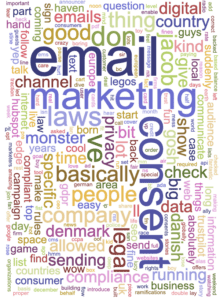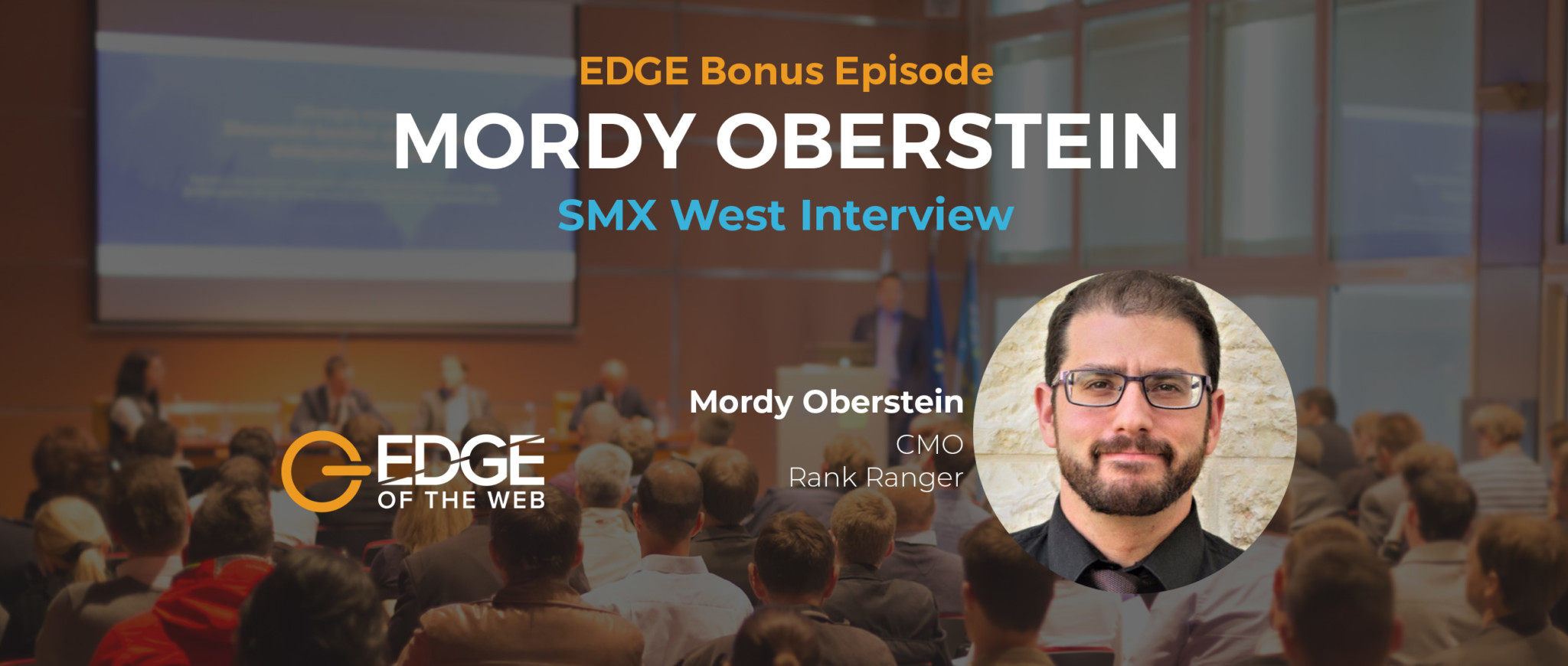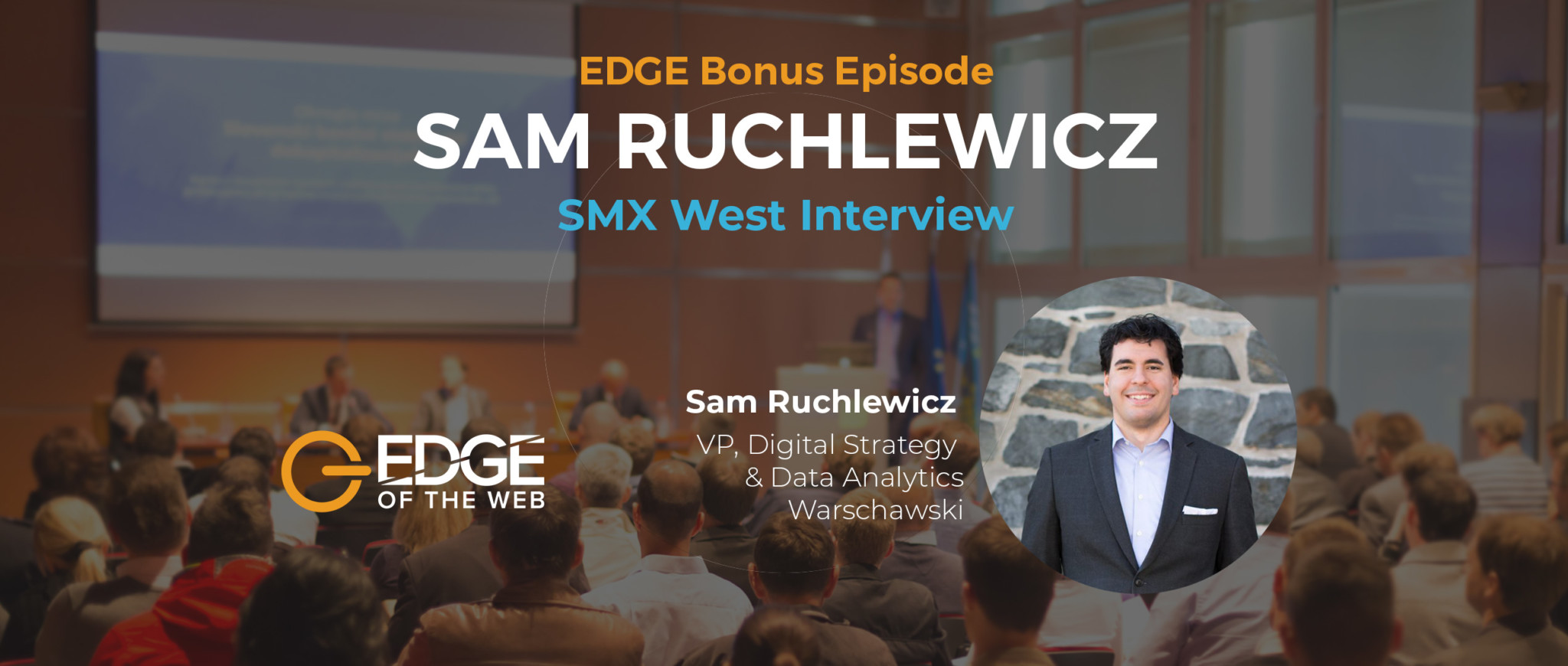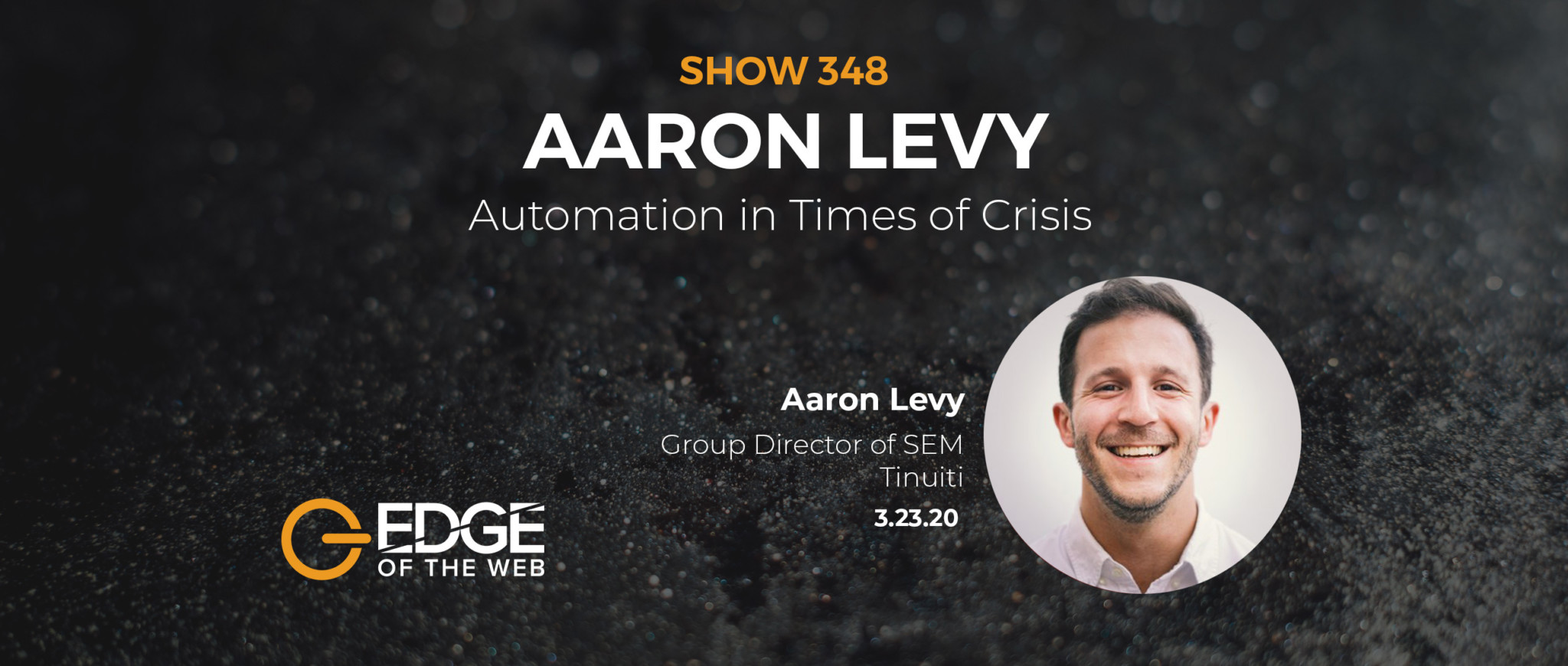Announcer: 00:01 On this episode of Edge of the Web.
Niklas Stephenson: 00:04 How do you actually do that in a way where it’s easy for the marketers, it’s easy for the company to do, but you’re still doing it right?
Erin Sparks: 00:13 Right.
Niklas Stephenson: 00:14 And that’s basically where Legal Monster got born. There’s no reason why everybody needs to map out these laws, find out how do we map it to our technology, and how do we prove that we’ve collected right consent, yada, yada, yada. There’s no need that everybody needs to invent that wheel again and again, right?
Announcer: 00:31 Your weekly digital marketing trends with industry trendsetting guests. You’re listening and watching Edge of the Web, winners of Best Podcast from the Content Marketing Institute for 2017. Hear and see more at edgeofthewebradio.com. Now, here’s your host, Erin Sparks.
Erin Sparks: 00:53 Welcome back to The Edge. This is episode 334, and I’m your host, Erin Sparks. Every week we bring you amazing industry guests to chat about digital marketing trends that are trending right now in the news, as well as some fantastic marketing influencers from around the planet. We unpack this topic of different digital marketing techniques and tactics for our audience. You want to check out all the recent shows over at edgeofthewebradio.com. We’re cranking out podcasts, videocasts, blogs, transcripts of each show for your digital consumption pleasure. So if you missed something, dive on over to Edge of the Web Radio.
If you’re new to the show, well, welcome. Let’s give you the ropes of the show. And here’s a breakdown of where you can find us. Over at YouTube, obviously, if you’re watching, it’s on our livecast. Check out YouTube.com/edgeoftheweb. You can find our podcast, check this, on iTunes, Google Play, Blubrry, Stitcher, Spreaker, iHeartRadio, Spotify, TuneIn, Player FM, SoundCloud, Luminary, Deezer. There’s a lot out there. And if we’re not there on your preferred podcast aggregator, let us know. Give us a line and we’ll be able to get our RSS over there. Over on the site, edgeofthewebradio.com, we’ve got the show notes, we’ve got the news that we cover in each and every podcast, as well as the transcripts. So if you want to deep dive with what we’ve talked about with the guest, go on over there and check us out.
So, Edge of the Web is brought to you by Site Strategics, title sponsor of the show. Site Strategics is a pioneer focused on digital marketing. Their core specialties are technical SEO, conversion rate optimization, omnichannel media marketing, and the like. So we’re focused on agile marketing, which is an iterative results-based digital marketing. So if you’re interested in what Site Strategics can do for you, give them a call at 877-SEO-4-WEB, or 877-736-4932.
And I’m going to toss it over to Jacob Mann who’s in the production booth.
Jacob Mann: 02:44 Hello.
Erin Sparks: 02:44 Oh, see, man, he’s on it now.
Jacob Mann: 02:46 Oh, let’s just give it a week. I’ll mess it up again.
Erin Sparks: 02:48 I’m just going to start asking for Ally. She’s over there too. How you doing, sir?
Jacob Mann: 02:52 She’s not even going to lean over and say hi.
Erin Sparks: 02:53 Yep.
Jacob Mann: 02:54 I’m doing well. We took the kids to the Toy and Game Fair in Chicago over the weekend.
Erin Sparks: 02:58 The Toy and Game Fair?
Jacob Mann: 02:59 Yeah, it was a lot of fun.
Erin Sparks: 03:00 How large is that particular fair? How many square footage?
Jacob Mann: 03:04 I don’t know.
Erin Sparks: 03:05 Was it a big, big, big thing?
Jacob Mann: 03:06 Yeah, it was pretty big. They use part of the conference center there on Navy Pier.
Erin Sparks: 03:10 Cool.
Jacob Mann: 03:11 And I forget how many vendors they have, but my two oldest are now at the age where we will let them run around together while my wife and I do our work stuff that we have to do there.
Erin Sparks: 03:21 Oh, wow.
Jacob Mann: 03:21 Because she’s doing lots of videos and everything else.
Erin Sparks: 03:23 You don’t give them a credit card, do you?
Jacob Mann: 03:24 No, no. No way. But you can play with everything there.
Erin Sparks: 03:24 That’s pretty cool.
Jacob Mann: 03:27 And then Lucy, who has her own YouTube channel, we did, I think 19 interviews with various game inventors and presenters and things like that. She just, she grabbed the mike and she’d tell me where we’re going next, and just all this stuff for her own YouTube channel. Keeping it super busy. So we had a really good time.
Erin Sparks: 03:44 Lucy’s got more subscribers than we do, right?
Jacob Mann: 03:46 She might. But it’s all good. So.
Erin Sparks: 03:50 Alrighty. All right. Well, that sounds like fun. And I’m sure Legos were in the space there.
Jacob Mann: 03:56 Oh, absolutely.
Erin Sparks: 03:56 Lots and lots of Legos.
Jacob Mann: 03:57 Legos, things that work with Legos. They had a guy that had a … He invented a thing that connects to Legos to make roller coasters. So you build your beams and everything else with Legos, and then you just add his tracks. He’s got little cranks or battery power to bring the cars up and bring them down, do loops, and it was really cool.
Erin Sparks: 04:14 Oh my gosh. Very, very cool.
Jacob Mann: 04:17 I’m a fan. It’s a good place to be.
Erin Sparks: 04:18 I got to check that out. All right.
Hey, good place to be. You know where a good place to be is? Wednesday, right on this channel, noon, we’re actually, it’s going to happen guys, we’re doing the live SEO audit with Andy Drinkwater. He’s healthy. He’s back. He’s going to be with us, and we’re going to tear up a site that was submitted to us and be able to bring out a lot of the different SEO factors that could really win the day for them. So stay tuned. Make sure you have a reminder, if you’re listening to or watching the YouTube channel, hit that bell so you can actually get reminded when we go live, because we’re going to do a live SEO audit. Noon, November 27th. Noon Eastern, November 27th. So make sure you jump in and ask some questions while we’re doing the SEO audit.
Just to let you know, a few guests are up coming. We’re going to have Elizabeth Marsten here, joining us on December 2nd, as well as Talia Wolf, who’s going to be with us December 9th, and Robert Rose who’s going to be joining us at the end of the year, November, December 16th. We’re thinking about doing one more show before we sign off for this year, but we’ll let you know what that is going to be in December.
All right, so that’s the housekeeping, now let’s get off to a good start here. Let’s introduce our guest who has been patiently waiting as we’re talking about Legos and the like. Niklas Stephenson, how you doing, sir?
Niklas Stephenson: 05:35 I’m doing great, and fantastic to hear that you’re talking about the Danish Legos all the way over there.
Erin Sparks: 05:42 Well, I mean, we all, both Jacob and I have four kids, so it’s, I mean … We do have to actually say one thing about Legos. Man they’re sharp.
Niklas Stephenson: 05:50 They’re so painful to walk on.
Jacob Mann: 05:53 Have you guys seen the-
Niklas Stephenson: 05:54 It’s the worst.
Jacob Mann: 05:54 Have you guys seen the video, it’s called Dad Training, and they put a guy on a treadmill and just pour Legos onto the treadmill and make him run on them?
Erin Sparks: 06:01 No.
Niklas Stephenson: 06:01 I think they’re mandatory in Danish school to learn to walk on Legos. We’ve definitely all done it.
Erin Sparks: 06:06 Just round the corners, just a little bit, please. It’s that nightly walk that just takes us out.
So Niklas, where are you hailing from today?
Niklas Stephenson: 06:14 I’m in Copenhagen, Denmark. So it’s 9:00 in the evening over here.
Erin Sparks: 06:18 Oh my gosh, well, thank you so much for joining us tonight.
Niklas Stephenson: 06:18 Always.
Erin Sparks: 06:21 We really appreciate you jumping on. We love to have our European friends join the show. Oddly enough, we get about 23-25% of our audience coming out of the EU and different European nations. So-
Niklas Stephenson: 06:35 That’s amazing.
Erin Sparks: 06:35 Yeah. We got to bring your Danish friends and talk some shop on our show tonight.
Niklas Stephenson: 06:41 I would love to do that.
Erin Sparks: 06:41 So we want to introduce you to our audience. Niklas is the founder and CEO of Legal Monster, and he founded Legal Monster as a way to help marketers not worry about if they’re breaking the local email marketing laws.
Niklas Stephenson: 06:41 Yep.
Erin Sparks: 06:55 So we’re going to dive into that because that’s a very, very important topic. And if you haven’t come across that, you need to pay attention to this show.
We also appreciate Ahrefs as being a continued sponsor to The Edge. Ahrefs makes competitive analysis very, very easy. Their tools show you how competitors are getting their traffic from Google as well as why, so you can see the pages, their content, their inbound links. Everything that you can actually help, that can help you in your competitive advantage. It’s not just about getting significant traffic though. Ahrefs’ tools also help you find topics worth creating pages and content on. It’s a great tool set. The Link Intersect tool, you got to check out. Be able to see explicitly where your competitors are getting their links commonly, where you don’t have visibility on that space. And be able to put together an intersect strategy just then and there. So, no to geek out on you, but those are really, really some cool things. So check out ahrefs.com. That’s ahrefs.com. Sign up for a tree … A tree frial. A free trial today. You’ll swim in great data, as we do here at our shop. So there’s our sponsor reference.
But let’s meet this week’s featured guest and dive into some good digital talk.
Announcer: 08:16 Now it’s time for Edge of the Web featured interview with Niklas Stephenson, founder and CEO of Legal Monster.
Erin Sparks: 08:26 Sometimes I just don’t know if I actually have some mini strokes on-air.
All right, so, let’s introduce our guest again. Again, welcome back to the show. If you’ve not come across this podcast, this is Edge of the Web Radio and we’re diving in with a good conversation regarding email and compliance of a number of factors, making sure that you’re going to be sending good communication with the consent of the audience.
Let’s introduce our guest. Niklas Stephenson. He’s the founder and CEO of Legal Monster. He founded Legal Monster as a way to help matters, marketers, I should say, not worry if they’re actually breaking the local email marketing laws regionally and worldwide. Before Legal Monster, he was a VP of growth over at Trustpilot. Congrats very much.
That’s the story of Niklas that we have. Niklas, tell us your backstory, because I know there’s got to be some good information out there.
Niklas Stephenson: 09:22 Oh, there definitely is. How long do we have? So I’m the typical multi-time entrepreneur. I started my first company when I was 16.
Erin Sparks: 09:32 Oh, very cool.
Niklas Stephenson: 09:34 I went to LAN parties with all my friends, and they were amazing at gaming and I was the worst in the world. So it was not very fun to spend the weekend losing in Counter-Strike, right? So instead, I learned to code and I learned to build websites, and I became a big part of the CMS called Joomla, or Mambo, back in the day.
Erin Sparks: 09:52 Mm-hmm (affirmative).
Niklas Stephenson: 09:53 I was part of the Danish community and was running that, and told people I was 25, but I was really 16. And basically from that, I built a consultancy that built websites and different kinds of web solutions. And that led into building a SaaS company here in Denmark that got sold this spring. And yeah, I had a tenure at Trustpilot as VP growth on the business side of lead generation. Very interesting to try and join a leadership team in a big, global company.
Erin Sparks: 10:20 Very cool. That’s a great story of how you climbed. And 16-year-old, starting their own company, we applaud that immensely. But I got to say, I got to press pause on that. Did you know they’re coming out with a new a Half-Life?
Niklas Stephenson: 10:34 Oh, no. I don’t know that one.
Erin Sparks: 10:35 Oh, my gosh. You haven’t? It’s going to be amazing.
Niklas Stephenson: 10:38 I don’t game at all. Like the only game I play is Magic cards on the computer.
Erin Sparks: 10:43 Oh, very cool. Very cool.
Niklas Stephenson: 10:45 Which is the best game in the world, right? But I usually don’t play it on the computer.
Erin Sparks: 10:50 Okay. So my 19-year-old kid is telling me about this, and it’s going to be fantastic. You got to swing back around and check it out. Just the visuals are going to be fantastic.
But, Magic cards. Man, he was also complaining that every time he comes back in, you got to get that new deck each and every season.
Niklas Stephenson: 11:05 Yeah.
Erin Sparks: 11:05 Man, that’s a money-making thing, isn’t it?
Niklas Stephenson: 11:08 I play with the old cards. The old paper cards from the ’90s.
Erin Sparks: 11:11 Oh, good, good, good.
Niklas Stephenson: 11:12 Yeah.
Erin Sparks: 11:13 All right. Yeah. It’s kind of a racket there. But you know what, what’s not a racket is paying attention to your email communications. So you started up this company. Boy, I hate those corny segues. I really, really do. You start up this company, and you’ve been paying attention to a heck of a lot of legal requirements for digital communication. So there’s a lot to consider whenever you’re executing any digital marketing, regardless of what platform. But email marketing and SMS text marketing have their own troubles. Can you kind of break out some of the pitfalls of executing email marketing, explicitly, incorrectly?
Niklas Stephenson: 11:54 Yeah. So I think to start a little bit higher, I think the internet is the fist global thing we have that is so cross-border without any means to govern it globally. So basically, the state we’re in now is that we have something like GDPR in Europe, but GDPR only covers privacy. It doesn’t cover marketing. So even in Europe, you have different marketing laws in each country. In the US, you even have different states with different marketing laws. And when you are present on the internet, no matter where you are, if you are marketing towards a certain country, you need to follow that local country’s laws.
And that’s an entirely new thing, right? If you’re running a Google AdWords campaign towards the UK, you need to follow British laws. Even if you’re running a English-worded language campaign on Facebook towards Danish people, you need to follow Danish law.
Erin Sparks: 12:53 So how in the world … You’re absolutely right. This is Earth-shattering. Really understanding that your communication, although it’s vetted in your local space, has ramifications worldwide. You’re certainly going to be marketing to different regions. But how do you get a hold of even an understanding of those particular laws and regulations?
Niklas Stephenson: 13:16 That’s the hard point, right? And that’s where Legal Monster got born in Trustpilot, was that Trustpilot is active in 80 different countries. So we basically had to map out the laws in 80 different countries. And we started by hiring 80 different law firms in 80 different countries.
Erin Sparks: 13:16 Wow.
Niklas Stephenson: 13:31 And asking them, you know, this set of questions. How are we going to do XYZ in your local jurisdiction? And then legal came to us in the marketing department with like, “So here’s 80 different ways you need to do things.”
Erin Sparks: 13:44 Oh, jeez.
Niklas Stephenson: 13:46 And, you know, not to share too many details, but that project is probably still running, right?
Erin Sparks: 13:52 It’s always going to be running, isn’t it?
Niklas Stephenson: 13:55 Exactly, exactly. So how do you actually do that in a way where it’s easy for the marketers, it’s easy for the company to do, but you’re still doing it right?
Erin Sparks: 14:05 Right.
Niklas Stephenson: 14:05 And that’s basically where Legal Monster got born. There’s no reason why everybody needs to map out these laws, find out how do we map it to our technology, and how do we prove that we’ve collected right consent, yada, yada, yada. There’s no need that everybody needs to invent that wheel again and again, right? So that’s basically why Stine, my co-founder, Soren, my other co-founder, and I started Legal Monster a year ago.
Erin Sparks: 14:28 Got it. So let me ask you this, the real-world ramifications here, let’s say that I’m actually doing a marketing execution towards Danish email consumers. There certainly are some rights and restrictions that are in place there. What’s the reality of myself finding my way into a fine by sending? If I’m sending 5,000 emails, right?
Niklas Stephenson: 14:56 Yeah.
Erin Sparks: 14:57 How’s it going to come back to me in a way of a compliance writ?
Niklas Stephenson: 15:02 So one thing you have to know as an American is that we have pretty healthy data authorities in Europe. And there’s basically just a standard fine for sending an email without the proper consent. It’s $25, roughly, per email. If you have sent 5,000 emails, and we’re not talking about email addresses, we’re talking about the number of total emails you have sent without consent. So let’s say you have 5,000 in your list. You email them once a month, and you’ve been doing so for 10 months. Then it’s suddenly 50,000 times 25 bucks, right?
Erin Sparks: 15:35 Yep.
Niklas Stephenson: 15:36 That runs up pretty fast, right?
Erin Sparks: 15:39 Absolutely.
Niklas Stephenson: 15:40 But if you do it wrong in the US, it’s $19,700 per email. So that can run really, really big.
Erin Sparks: 15:48 Are you serious?
Niklas Stephenson: 15:49 Yeah.
Erin Sparks: 15:50 Oh my.
Niklas Stephenson: 15:50 The rules are also a lot lighter in the US, so it’s harder to do it wrong. But if you’re doing it wrong, let’s say that you have people unsubscribing from email and you’re still sending them emails, then you can basically end up in quite a pit.
Erin Sparks: 16:06 Oh my gosh. $20,000 per email. All right.
Niklas Stephenson: 16:08 Yep.
Erin Sparks: 16:09 Yeah, that boggles the mind.
Niklas Stephenson: 16:11 Yeah, and it’s a Danish company that got a $1 billion fine in the US.
Erin Sparks: 16:16 Are they still around?
Niklas Stephenson: 16:16 A pretty big, public company, yeah.
Erin Sparks: 16:19 Okay.
Niklas Stephenson: 16:20 But they had to stop all marketing efforts in the US for an entire quarter.
Erin Sparks: 16:25 Just to recoup?
Niklas Stephenson: 16:26 Just to recoup.
Erin Sparks: 16:26 Oh my gosh. All right. So how would one get notified if you are actually in fact breaking the law there?
Niklas Stephenson: 16:33 So that’s of course always hard, right? Because if you’re a small US company that is running a campaign towards the Danish market and you’re never present here or anything, but you know, a letter. Just getting a court case here in Denmark would not be fun, right? And that’s basically where it would end up.
Erin Sparks: 16:50 Oh my gosh. So-
Niklas Stephenson: 16:52 It would be handed over to the Danish police, and then the police would be running a court case from there.
Erin Sparks: 16:54 So you’d get a notification in Denmark that you are required to be a participant of that court case.
Niklas Stephenson: 17:01 Yeah, exactly.
Erin Sparks: 17:01 So you could very well … And then you just compound it with any other countries that you’re actually sending to.
Niklas Stephenson: 17:01 Oh, yes.
Erin Sparks: 17:07 And they all have their own procedures, and their own notification procedures, right?
Niklas Stephenson: 17:12 And different fine levels as well.
Erin Sparks: 17:13 Yep, and different fine levels. So you have no idea how to navigate this. So this, and we can’t be in this infancy status anymore. We have to realize that, and we do understand this. GDPR is the law of the land, so to speak, in Europe, and we understand that privacy is essential, but on top of that, regulations like CAN-SPAM Acts here in the States really … I mean, those are, they’ve already been well accepted and well defined.
Niklas Stephenson: 17:46 Yep.
Erin Sparks: 17:46 So here’s my question to you, is that privacy is, privacy regulations are relatively a new set of standards, but email regulations have been here for a long time.
Niklas Stephenson: 17:57 There’s nothing new.
Erin Sparks: 17:57 Why are we not rigorous? Why are we not paying attention to … Why do we have a lack of knowledge in this space, Niklas?
Niklas Stephenson: 18:06 I think it’s a few things. I think, first of all, the internet has been the Wild West for many, many years, right? And now suddenly we’re actually trying to, or starting to see these states pop up that actually start to make laws and appoint someone chair of, right?
Erin Sparks: 18:18 Right.
Niklas Stephenson: 18:18 So the days of running around as a mountain man is over. And now there is a sheriff in town, right? And especially in Europe, we’re starting to see these data priorities get a lot more resources. So for instance, the data authorities in the UK has, I think they have tripled their resources just last year, and over the last five years it got 50 times the resources that they used to have, right?
Erin Sparks: 18:39 Oh my gosh.
Niklas Stephenson: 18:40 So suddenly, there’s actually a police force that can look into these cases. And I think GDPR was just such a Earth-shattering thing for the entire internet that people have actually started to look around and see what are there actually of laws out there. So in Denmark, for instance, we have had the marketing laws for a long time, and the Danish data authorities have actually automated the fine given. So if a certain amount of people complain about a certain email address, they will look into it and that’s completely automated. You just forward spam to a certain email address and they will take it from there. So we’ve had that a fairly long time. You have seen fines for, I think the last five or six years. But that’s now starting to come to other markets as well, right?
Beforehand, Denmark was just such a small … We’re the same size as not even San Francisco. I mean, 5.5 people in total. Usually call it South London. So it’s not really like people look to Denmark to be inspired, but suddenly Europe comes out with GDPR. And now people are actually looking into what they need to do.
So for instance, in Europe we also have a thing called, in German it’s called Impressum, which is the laws that define what kind of information you need to share of your website around the entity that is communicating.
Erin Sparks: 19:51 Oh wow, okay.
Niklas Stephenson: 19:52 So if you have a company website, you have to communicate the phone number, the person who is data responsibility, your physical address, your company or your station number, and a few other things. And those rules are also in Denmark, just a little bit differently. They’re also in the UK. And they’ve been there for 10, 15 years. Nobody looked at them before.
Erin Sparks: 20:10 It’s almost like ADA website compliance here in the states. ADA came about in 1974. But only in 2008 did electronic documentation side of this really get some teeth. And then they actually tied into WCAG, a consortium of accessibility guidelines. And all of a sudden, now we have, we’re hearing horror stories upon horror stories of compliance issues where the Department of Justice gets involved and sites are being fined quarter million dollars for not having their pharmacy page visually compliant. Or auditorily compliant.
Niklas Stephenson: 20:49 Exactly.
Erin Sparks: 20:50 So there’s a heck of a lot of things that have been in existence. Are there organizations that are, to your point of making sure that the websites in the European space, websites actually have content about the entity, are there organizations that are policing just that very fact on a regular basis for different domains that are hosted in different countries?
Niklas Stephenson: 21:12 Yes, it’s the same data authorities that is doing the same work.
Erin Sparks: 21:12 Got it.
Niklas Stephenson: 21:18 And those organizations, again it’s just growing and growing. In Denmark, I think they have 30 open positions right now. So it’s really growing.
Erin Sparks: 21:24 Wow.
Niklas Stephenson: 21:25 And people can just complain directly to them, as they can complain to the police about someone violating the normal laws. And then they will look into it.
Erin Sparks: 21:33 All right. So what horror stories have you heard to share with our audience? We’ve gone through a few hypothetical fines. But if you can share anything regarding ramifications of a lack of adherence to these particular regulations, or just ignorance of this, can you lay a few on us?
Niklas Stephenson: 21:53 Yeah, so I think what we’re starting to see as well … So, we’re a venture-backed company, so I’m hanging out with a lot of venture-backed companies here in Europe. And what we also start to see is that it’s not only a question about the authorities coming after you with big fines, but it’s actually also about deal-making. So going through a check if you’re closing a round of funding and you have your due diligence, or selling your business, this is also getting on the list of those due diligence checks. So an unnamed, no-name company here in Europe was selling a big part of the company and it turned out that they didn’t have the right email marketing consents. And a big part of their revenue channel was actually sending out emails. And suddenly the buyer, even five months into the deal, just before closing pulled out. And said, “Sorry, we can’t buy. If 95% of your revenue is coming from email and you don’t have the right to email people. What is the value of your business?” And they ended up giving a 20% discount on the deal.
Erin Sparks: 22:54 Now, that’s a really good point is that whenever there are buyouts of organizations, the assets of a company are not just the physical assets. Certainly not the bulk of business. But it’s also their email, their marketing campaigns. Their marketing engine that they have actually developed. And if you’re out of compliance, it could very well kibosh the deal. That’s terrible.
Niklas Stephenson: 23:16 You know, what is the value of your email list if you’re not allowed to email them? Right?
Erin Sparks: 23:20 Yeah, exactly.
Niklas Stephenson: 23:21 It’s that simple.
Erin Sparks: 23:23 Yeah. I’m going to buy a criminal action. That’s what I’m about to do.
Niklas Stephenson: 23:27 Exactly, yeah.
Erin Sparks: 23:28 Oh, jeez. Give me another example of something.
Niklas Stephenson: 23:32 Just a traditional, have asked the wrong questions or no consent questions when people sign up for your lists. And sending out emails where you cannot prove how you obtained the consent. I think another thing that people do often is the abandoned car emails from ecommerce companies. You’re not allowed to send them if you don’t have specific consent for sending email offers.
Erin Sparks: 23:53 Okay, let’s just pause that. And let’s reiterate that to our audience, is that if you have somebody who’s registered as a potential customer on your site, and if they’ve actually gone through in add to cart and backed away, unless you have specific consent being communicated in their sign up process, right?
Niklas Stephenson: 24:16 Mm-hmm (affirmative).
Erin Sparks: 24:16 And more importantly, if they’ve opted out and they still get that email, you’re out of compliance and you’re breaking the law.
Niklas Stephenson: 24:23 And it needs to be so specific that you need to state the purpose of what emails you’re going to send. And if you don’t include special offers or any kind of wording that covers a [inaudible 00:24:35] carpet covering email, still breaking the law.
Jacob Mann: 24:38 Does that apply just to email, or would that also include remarketing ads? Because I’ve had it before where I’ve added something to my cart, gone away, the next day I have an ad that literally says, “Hey, you still have something in our cart.” It’s not an email. Does it apply to that as well?
Niklas Stephenson: 24:53 Now I’m going to disappoint a lot of people. Yes it does.
Erin Sparks: 24:57 Oh, no, no, no. He said it.
Niklas Stephenson: 25:00 So basically, you need a specific consent per channel. So if you’re going to text message, you need specific consent. If you’re going to do specific remarketing towards an individual, either based on a cookie or based on an email address, that is communicating via a channel as well. You need specific consent. And it needs to be individual consent. So you cannot bundle it all together and just saying, “Oh, we’re allowed to email, text, and remarketing.” That is not, that’s not allowed.
Erin Sparks: 25:29 All right. So here’s another question. A little bit different take on it, is that yeah, you as the company, that are communicating to these customers unbeknownst to them, right?
Niklas Stephenson: 25:42 Yeah.
Erin Sparks: 25:43 They haven’t signaled consent that they want to be marketed to, and that’s a great question Jacob, is that all of a sudden, the stalking remarketing happens. Well, it’s not just the company that’s actually doing the marketing. It’s potentially the marketing agency that’s also executing on behalf of their client, correct?
Niklas Stephenson: 26:03 Yes. Correct. And I think-
Erin Sparks: 26:04 What ramifications come at the agency that’s actually participating in out-of-compliance marketing execution?
Niklas Stephenson: 26:12 I think it’s … I don’t have a specific case for that.
Erin Sparks: 26:12 Sure.
Niklas Stephenson: 26:15 But I think first of all, you’ll lose clients and it will hurt your business if you’re not all the way out on your toes on this. Because this is the future of advertising is that you need to adhere to all of this. So if you are an agency out there and you’re not a wildest expert in this area, you’ll be in trouble in the next few years.
Erin Sparks: 26:34 Oh my gosh. All right. Well, we’ve seen it coming. And again, our firm, we’ve known about ADA compliance for the longest time. You have to be in that process of mitigating that issue. Inside of email you have to make sure. And let’s talk about auditing email list for a second. Is that, it’s commonly said that, okay, if I conduct business with this particular consumer group, then by inference, they’re allowing us to communicate as well as communicate with them digitally. Is that not the case? Or are we in a gray area?
Niklas Stephenson: 27:13 It depends a little bit on what you’re doing. So if you are running a service with a subscription, you are allowed to communicate around the service you are delivering. But you’re not allowed to send a offer for something related.
Erin Sparks: 27:27 What does related mean?
Niklas Stephenson: 27:28 So let’s say, just as a stupid example, you’re running Spotify and now you want to sell musical instruments as well, right?
Erin Sparks: 27:36 Sure.
Niklas Stephenson: 27:36 Or you’re running a consumer-faced service around music. You’re just not allowed to start sending email and newsletters to all your subscribers saying, “Oh, by the way, now you can buy a guitar cheap.”
Erin Sparks: 27:44 Got it.
Niklas Stephenson: 27:45 You’re not allowed to do that. So basically, and you’re not allowed to do anything without a proof of how the consent was obtained. So one thing is obtaining the consent. That is advanced in itself because the rules are so different from country to country. And we can get into that in a bit.
Erin Sparks: 28:00 Yeah.
Niklas Stephenson: 28:00 But your evidence of the consent is even more important. Because maybe you asked the right question, but if you don’t have your evidence in order, how can you prove that you asked the right question?
Erin Sparks: 28:00 Absolutely.
Niklas Stephenson: 28:12 And thereby, there’s no consent.
Erin Sparks: 28:14 So if there’s a regional firm that does professional services and they’re working with customers, they’re taking the email as part of their customer data intake. You’ve got to communicate to them on either the form they’re filling out or … Their online form or their physical form, that you will be using this for email communication and solicitation of business, correct?
Niklas Stephenson: 28:37 Yes. And the question you need to ask is also different from country to country. So for instance, in the States, it’s enough to inform saying that by submitting this form, you’ll receive email from us about these topics or purposes. And that is also different from what kind of personality or persona these people are. Because there’s a lot of different rules around consumers, and there’s less laws around B2B communication.
So for instance, in the UK, you are allowed to do the same, the US model, where you just inform about email marketing as a part of a signup flow, without any active consent towards businesses. But as soon as it’s towards consumers, you have to actually have that checkbox and it’s not allowed to be pre-checked. So it’s only the people that actively go in and check the checkbox.
And then if you have users coming from Germany, well, then you have to have the checkbox and you have to have double opt in. Which is basically, you know, sending an email and confirming that email with a click. Otherwise it’s not a valid consent.
Erin Sparks: 29:38 Got it. So yeah, let’s unpack the differences of regional consent laws a little bit further. So you’ve got double opt in. What else is required in different countries?
Niklas Stephenson: 29:50 So the presence of a privacy policy is in almost all European countries required, in terms of marketing laws. But it’s always required in terms of GDPR. So there’s also two sides of these consent compliance. There’s GDPR laws, or privacy laws, and then there’s marketing laws. But even marketing laws in quite a lot of countries state that you need to be shown a percent of the privacy policy in connection with giving the consent.
Erin Sparks: 30:18 Got it.
Niklas Stephenson: 30:18 And then there is requirements to what the privacy policy then needs to inform you about. So for instance, it needs to inform you about how and where you can unsubscribe. It needs to inform you about a lot of other different things, right? That’s the most marketing-specific topic, right? So you should always communicate this is where you can unsubscribe, or you can unsubscribe by sending us an email on this email, et cetera.
Erin Sparks: 30:41 Yeah, it’s got to be blatant and very, very obvious.
Niklas Stephenson: 30:44 Yes.
Erin Sparks: 30:44 Got it.
Niklas Stephenson: 30:44 And then there’s different laws around the specific texts. So the purposes you’re going to email about need to be in there. So if you’re going to invite for a webinar, you need to have the consent to email about webinars. If you only have the consent to email about a special offer, and then suddenly, a special offer being a discount code or something, and then suddenly you invite for an event. You don’t have that consent. Don’t have the consent to email about that topic. Which is the same as emailing it without any consent, right?
Erin Sparks: 31:15 Right. Absolutely. Because each and every type of message is going to require that particular message communicate to that consumer. “Hey, we’re going to talk about this in this channel, this channel, and this channel.”
Niklas Stephenson: 31:27 Exactly.
Erin Sparks: 31:29 That’s a … And on top of that, you also have to pad your best of, so to speak, that even a channel that you haven’t thought of yet also has to be covered. Now, how do you do that?
Anyway, well, Jacob’s got a question.
Jacob Mann: 31:42 Yeah, it might kind of fit with what you’re saying. So if you get consent for special offers and then you decide you want to do something else, can you email to request additional consent, or are you just stuck at that point?
Erin Sparks: 31:53 Right.
Jacob Mann: 31:53 Having not collected enough?
Niklas Stephenson: 31:53 That’s been a gray area. So I think the question, I’ll broaden it a little bit. The question we get the most is that we want to do the right thing, but we’ve done the wrong thing forever and now we have this big email list. What do we do? Can we wide brush it in any way? And the fact is just that you don’t have any consent to email them about that. So you have no consent to email them at all.
Erin Sparks: 32:14 Oh, you’re killing me, Smalls.
Niklas Stephenson: 32:16 Yeah. And I think of course you need to be pragmatic, as well, right?
Erin Sparks: 32:19 Right.
Niklas Stephenson: 32:19 So if you have a healthy list that you’ve emailed for a long time, and this is not legal advice, by the way, you can do stuff to clean it out. You can send an email saying, “Oh, by the way, we just want to be sure that you want to continue getting our emails. Please click this link.” And then make sure you collect the proper consent.
Erin Sparks: 32:36 Right.
Niklas Stephenson: 32:37 But according to the law, it’s not a gray area. You are not allowed to send them emails.
Erin Sparks: 32:43 There’s such a disbelief, or I should say a belief, that if you have customer data, you should be able to communicate to them. And it’s so naïve, but we hear it time and time again from companies that are not in the digital space, that are B2C service providers that they’re scratching their head. “Hey, we’ve got 10 years of consumer data. You mean I can’t use any of it?” You can’t even use it to even start a campaign. You cannot communicate to them.
Niklas Stephenson: 33:15 Exactly. So imagine walking into a store, physical store, buying something with your credit card. You can only buy that thing with your credit card if you hand over your email address, right? That’s basically the same thing as shopping online because of course you want to hand over your email address so you can get notifications about your order, get the invoice, et cetera, right?
Erin Sparks: 33:34 Right.
Niklas Stephenson: 33:35 Imagine that every time you walked into a physical store and swiped that credit card that they could then send you emails. That would be crazy how many emails you would get, right?
Erin Sparks: 33:46 Oh, absolutely. Absolutely. As long as I give them my junk email, then I’m fine, right?
Niklas Stephenson: 33:50 Exactly, but you cannot choose not to hand over your email when you’re shopping online because you hand it over for a different purpose.
Erin Sparks: 33:58 Right. I see.
Niklas Stephenson: 33:59 Right? So that’s again where the purposes come in. Without having consent for the right purpose, would you really break the trust of your customers by misusing their data that they have to hand over to you?
Erin Sparks: 34:11 And then that’s the level of seriousness that you have to take whenever you’re looking at your consumer data, is that there’s a trust there and you’re breaking that trust in order to be able to market, to be able to move that content in front of them. That’s why these laws are there, guys, is to protect you as a consumer, as well as the transaction that was originally intended for. You don’t have the rights to move all the way around, and remarket to them in other areas that they haven’t consented to.
Niklas Stephenson: 34:42 Exactly. And I think it’s kind of our own fault that all these laws are coming, right? Because it’s all because we’ve misused consumer data for years.
Erin Sparks: 34:51 Right.
Niklas Stephenson: 34:52 It’s all because, as I said before, the internet has been the Wild West for many, many years and now suddenly there are governments have figured out that we need to do something about it. Because it starts to have real impact on the society. So I think, for me, it’s actually quite simple. Look yourself in the eyes and say, “How would I feel if I was a customer here and people doing this with my data?”
Erin Sparks: 35:15 Right. We’re all consumers.
Niklas Stephenson: 35:19 Exactly.
Erin Sparks: 35:19 So we’re on the other side of the fence on a regular basis. It just, I guess the wires haven’t fully connected from a business standpoint. And on top of that, that agency that you’re employing, right?
Niklas Stephenson: 35:29 Oh yes.
Erin Sparks: 35:30 Has a responsibility. And that’s a vetting side of things, is that if that agency is not adhering to these type of compliance regulations on behalf of you, they are putting you in jeopardy.
Niklas Stephenson: 35:42 Exactly.
Erin Sparks: 35:42 And you need to be paying attention to that. So I’m sure you have a checklist of what to ask of your email marketing provider for companies, but on top of it, your service, and again, this is not a sponsorship, we’re just referencing. The company has a very strategic focus here. You’re providing a level of information across 80 different countries of what those legal stipulations are. And you also have an API connection over, too, a number of different EMS systems like HubSpot and the different email providers, right?
Niklas Stephenson: 36:17 Yeah. So basically what we’ve done is that we have, it’s kind of a three-piece product. So we’ve gone out to local law firms. A little bit like I described before, that we did when I was at Trustpilot. And then we asked them, so how are the local laws around this area? And how should that function, both in English and in your local language? And then we mapped all of those countries together in one big, what we call our legal framework.
So basically when a consumer comes to your website, we’ll find their location from their IP or from you telling us if you know it. And then we’ll know how should your consent collection method be? And how should we word the consent questions? All the input from you, knowing that you’re marketing towards B2B or B2C, in what context are the forms, or is it a checkout flow or is it a subscribe to newsletter flow. And then also we have your privacy policy, we have the different purposes you’re going to email about, and all of that we boil down to the right consent text that is converting as much as possible by still being legal.
And if your visitor then comes from Denmark, we’ll follow Danish laws. If they go to Germany for the weekend, we’ll follow the German laws, as we should do. And basically automatically collecting the right consents.
Erin Sparks: 37:32 Yeah, what’s going to happen is that this should cover all bases. You’re just going to have a consent check box that is larger than the form itself, just to-
Niklas Stephenson: 37:40 No it will not be. It will not. And I think a company like HubSpot, and I love to use HubSpot. I’ve been a HubSpot user for many, many years. But they went into full panic mode when they did their GDPR compliance product. Basically the wording of their consents are crazy and the way the flows work are crazy. So actually, a lot of our customers are HubSpot users because HubSpot’s own GDPR privacy product is basically in scaring people away.
So I think the balance that we’re always trying to be in between, and where Stine and I as a founder team with Soren on running product, is quite interesting is that I come from a marketing background and Stine is one of the leading privacy lawyers in Europe. So kind of we always have that battle, that basically where Legal Monster got born out of in Trustpilot. We have that every day in the two desks where we’re sitting next to each other, right? Because we know that that balance is so important for our customers. If we make a consent text that doesn’t convert, people will remove it.
Erin Sparks: 38:40 That is huge, yeah. Absolutely.
Niklas Stephenson: 38:42 And in the end, for us, what we want to do is enable companies to be good data citizens. And basically give end users a trust in our customers and enable our customers to do the right thing. And if we do that in a legal mumbo-jumbo way or in something that will hurt your conversion rates, it will just not happen, right?
Erin Sparks: 39:04 Right.
Niklas Stephenson: 39:04 So it’s always that balance in between what are the legal requirements, how can we write it in a friendly way, and how do we tie all of this together?
Erin Sparks: 39:12 Yeah. It comes with some auto-sensing against the IP, so you know obviously which methods to deliver. And on top of that, a little bit of user testing so you can actually-
Niklas Stephenson: 39:20 Oh, a lot of user testing.
Erin Sparks: 39:21 … compact that down into a space.
Niklas Stephenson: 39:21 Exactly.
Erin Sparks: 39:25 Conversion is the name of the game here, and that’s got to be on every business owner’s mind is, “Okay, I’m compliant.” Now you got to see the other side of the equation of what, in fact, is the fallout from that. So you guys focus on that on a regular basis to be able to help us in that space.
Niklas Stephenson: 39:25 We definitely do.
Erin Sparks: 39:44 Very good.
Niklas Stephenson: 39:45 Definitely do. And that was also born out of Trustpilot when we had to start to collect the consent for privacy policies on Trustpilot way back. We just put it live in the most important funnel of all, and suddenly we saw a conversion rate drop of 40%.
Erin Sparks: 39:58 Really?
Niklas Stephenson: 39:58 And that’s a funnel that drives into the entire business. And of course we could not accept that, right? And imagine that you have a landing page offering a free ebook on a SaaS website, right? And your offering goes live globally because everybody speaks English, and you’re running the same marketing campaign towards multiple markets because that’s entirely normal these days. In the US you can go by by informing that by downloading this ebook, you will also get a nurturing campaign about this topic from this company. And that’s kind of your goal when you give away something free is actually to be able to nurture them so you can building marketing-qualified leads and hand them over to sales, right?
Erin Sparks: 40:37 Right.
Niklas Stephenson: 40:38 But in Germany, you need to have a checkbox. And you need to have a checkbox for the privacy policy. You need to have a checkbox for the email communication. That cannot be pre-checked, and you need to do the double opt in on the email.
Erin Sparks: 40:50 Oof.
Niklas Stephenson: 40:51 Right? So how do you think your conversion rate would do if you went out globally and did the German model?
Erin Sparks: 40:56 Right. Can’t do it.
Niklas Stephenson: 40:57 Exactly.
Erin Sparks: 40:58 You’d lose more than 40%. I mean, you’d lose-
Niklas Stephenson: 41:01 Way more. Way more. Like 95%, right? But suddenly, if you do that, you’re losing out on a US market by being way too over-compliant. Right? But of course you need to be compliant in the German market. First of all, also because it does just have data ethics and a pull from the market by doing the right thing after their cultural background is very, very different when it comes to privacy. So it’s just a really, really hard thing to do.
And then on top of all of this, if you cannot prove your consent, as I said a few times, you don’t have it. So just by saving that they were Boolean and they said yes to email marketing in HubSpot, that’s not legal evidence, right?
Erin Sparks: 41:40 Oh, wow.
Niklas Stephenson: 41:41 So we’re actually saving 21 data points about each consent that basically, you know, proves that this user said yes to exactly this version of your privacy policy. To exactly these email marketing purposes, et cetera, et cetera, et cetera.
Erin Sparks: 41:55 Oh my gosh.
Niklas Stephenson: 41:56 And we store all of that in an audit trail. And I think you made a point when we talked about Uber and communication and the compliance rules in the US about how long you need to store that kind of information. You also need to store these consents. And in Denmark it’s five years.
Erin Sparks: 42:09 That’s also about how you’re storing them.
Niklas Stephenson: 42:12 Oh yes.
Erin Sparks: 42:13 And what documentation you clearly extract, because that Boolean checklist, that’s deep, deep, deep in a database table field, right?
Niklas Stephenson: 42:23 Yeah.
Erin Sparks: 42:23 Is not going to be evidence. Your going to have to have some sort of printable record. So you guys have printable records of any individual, right?
Niklas Stephenson: 42:32 Yes.
Erin Sparks: 42:32 They can format it in a PDF, be able to tear it off right there, there’s the evidence.
Niklas Stephenson: 42:36 Yes.
Erin Sparks: 42:36 Very good.
Niklas Stephenson: 42:37 And the evidence has also been proven by local law firms. So we know that it would hold up in court, as well.
Erin Sparks: 42:37 Got it.
Niklas Stephenson: 42:44 And we are that trusted third party that is able to prove your consent.
Erin Sparks: 42:48 Jake, you got a question?
Jacob Mann: 42:49 Yeah. So you kind of covered it there, but I wanted to get clarification on something. So we talk about going global. Obviously it makes sense you have to look at everything you have to do. What happens if your goal is not to go global, but for whatever reason, the product I’m selling only to an American audience gets traction in Denmark? I never had any intent to do that. So do I need to protect myself for a global audience just in case it takes off? Especially if it’s something digital where I don’t have to … Because it’s easy to say we only ship in the USA. But if you’re doing something that’s digital or a service, then you can easily do it globally. So if you guys pick up and like my thing, what do you do then?
Erin Sparks: 43:27 Hello.
Niklas Stephenson: 43:28 I think first of all, congrats, because traction is the hardest thing in being an entrepreneur. Building products and the rest of it, that’s easy-peasy. But getting traction is the hard piece.
Erin Sparks: 43:37 Yep.
Niklas Stephenson: 43:38 So the rules are also, again, a little bit gray. So if you market towards a specific country, you need to obey to the rules. So let’s say that you got traction in Denmark because you were running a AdWords campaign that you, by mistake, checked off the “Run it in Denmark” box. Then you need to obey to Danish rules. But if you’ve never done anything specific for Denmark-
Erin Sparks: 44:00 Organically, it happened. Right.
Niklas Stephenson: 44:02 Organically it happens, then you will be in the green for a period. But the bigger you get, the more into the gray area you will come.
Erin Sparks: 44:09 So is there a percentage of the IP traffic that’s coming from a particular country that is a threshold moment to be able to then trip over into another level of compliance law?
Niklas Stephenson: 44:20 Yeah, I think that will impossible for us to put a number on-
Erin Sparks: 44:20 Oh, sure. Yeah.
Niklas Stephenson: 44:24 … but I’ll say I think the best rule of thumb is that if you’re doing anything concrete or even thinking about doing anything concrete in a specific country, then you should get your house in order.
Erin Sparks: 44:33 Got it. All right. Well, there is a lot here.
Niklas Stephenson: 44:37 Oh yeah.
Erin Sparks: 44:38 There’s a lot. And certainly I applaud you for diving into this, because man, this is a hot-button issue that really not many people want to tackle and take on. But it certainly is the law and you have to have the ability to comply with it. And it’s just untenable unless you have a scenario, I guess, or solution such as what Legal Monster, because it literally is a monster that you’re dealing with.
Niklas Stephenson: 45:04 That’s where the name comes from.
Erin Sparks: 45:06 All right, here’s a softball for you. What would you recommend to listeners that are buying email lists?
Niklas Stephenson: 45:15 Don’t.
Erin Sparks: 45:16 Okay. Done.
Niklas Stephenson: 45:17 It’s that easy. It’s impossible to prove your consent evidence and the trail of where did they say yes to hand over this email to a third-party. In Europe it’s illegal in every country. It’s even some states in the US. Just don’t. Don’t, don’t, don’t, don’t, don’t.
Erin Sparks: 45:17 All right.
Niklas Stephenson: 45:38 It will, a little bit like building your entire house on top of Google, one day it will be gone.
Erin Sparks: 45:44 It will crumble.
Niklas Stephenson: 45:45 And in this case, you’ll just have a fine as well.
Erin Sparks: 45:48 All right. So here, this is great placement. We’re going to recommend to our listeners, you want to join our email newsletter, and give us full consent on letting us know how we want, how you want us to send that email newsletter, go over to edgeofthewebradio.com and sign up right there. We are compliant to all GDPR and CCPA laws. Damn it. Or you can text to the number 22828 and get the process started. No, that is not a consent to actually send you, if you text them a message. I’m just going to rewrite my entire newsletter speech because of this.
Okay. So, I got to tell you Niklas, it’s been a pleasure. And there’s so much more to unpack. I realize that. There’s literally, I’m sure there’s stories for every country that we’d love to get into. But alas, we’re out of time here.
Every show that we do with a guest, we want to ask them a couple quick follow-up end of show questions. What bugs you about your industry right now?
Niklas Stephenson: 46:50 It’s super boring. Everybody is dark blue, called Consent something, or Audit something, or Compliant something. Come on, guys, light up a little bit. Get a funky monster and be fun, right? People will not do this. People will not comply as long as it’s a boring, boring task, right?
Erin Sparks: 46:50 Right.
Niklas Stephenson: 47:10 And we need to enable people to do the right thing. So I think as an industry, we need to get together and have a little fun.
Erin Sparks: 47:16 Very good. Okay. Conversely, what excites you about your industry? Because evidently they’re all boring and they don’t wear lampshades at all at the party, so what’s exciting in your industry?
Niklas Stephenson: 47:26 I think what’s exciting is, and I think I nodded to it a little bit earlier, is the internet is such a big, global factor these days. And human rights has not been a thing on the internet.
Erin Sparks: 47:35 Right.
Niklas Stephenson: 47:36 And we can either destroy the internet completely and it will ruin our civilization as we know it, or we can save it and make it into something super awesome. And I think that’s basically, that’s the path we’re on when it comes to privacy.
Erin Sparks: 47:49 Super awesome, like a Tivoli animal, perhaps?
Niklas Stephenson: 47:53 Or just the free speech, the open information highway that’s as it was intended to be, right?
Erin Sparks: 47:53 Absolutely.
Niklas Stephenson: 48:00 And not something that affects election all over the place and put people into power that shouldn’t be in power.
Erin Sparks: 48:05 Oof, there’s one for the books right there. I think we’re just going to use that as the soundbite.
Niklas Stephenson: 48:11 I’m half-British. I’m mainly looking at Brexit.
Erin Sparks: 48:14 Oh, yeah, absolutely. That’s a mess. That is a mess.
Niklas Stephenson: 48:18 That’s a proper mess.
Erin Sparks: 48:18 Oh my gosh. And the elections haven’t happened yet, or have they?
Niklas Stephenson: 48:22 No, next month.
Erin Sparks: 48:23 Next month, next month. And that’s another election just on Brexit that they voted three and a half years ago.
Niklas Stephenson: 48:30 Oh yes.
Erin Sparks: 48:30 Oh my gosh. This is terrible. All right.
Niklas Stephenson: 48:32 And you know, fun story to close off, so I have five family members living in the UK, and three of them voted leave and all three have died since the vote. So they basically just left the rest of the family with a country that is leaving the EU.
Erin Sparks: 48:46 Oh my gosh.
Niklas Stephenson: 48:50 And it’s, yeah, it’s quite funny.
Erin Sparks: 48:53 There’s an inheritance right there.
Niklas Stephenson: 48:55 Yeah, exactly.
Erin Sparks: 48:56 Oh my gosh. Oh. What a morbid joke. I appreciate that. All right, hey-
Niklas Stephenson: 49:00 Yes, welcome to Denmark.
Erin Sparks: 49:04 We got to talk to you again, Niklas. We certainly appreciate you coming on board.
Niklas Stephenson: 49:08 You, too.
Erin Sparks: 49:09 If we have some questions, can we come back around and talk to you a little bit more about this?
Niklas Stephenson: 49:13 Always. Always.
Erin Sparks: 49:14 We really appreciate that.
Niklas Stephenson: 49:16 Just shoot me an email or write me on Twitter and I’ll always be right there.
Erin Sparks: 49:19 Very good, very good. Our recommendation to businesses and marketing agencies alike is do not take this lightly. You must be in compliance. You must be moving on this if you’re not already. So finally thought for businesses that haven’t even looked at privacy and consent laws.
Niklas Stephenson: 49:39 Yeah, so shoot me a Tweet or reach out to me and we’re actually offering a free compliance check. So we can get you, give you a report and tell you where you should start and how you should get off the race to do the right thing, right?
Erin Sparks: 49:52 Very good. Well, thank you. And we’re certainly going to give that information out here real quick. Be sure to check out all the trending news. We did cover with Niklas on the bonus episode and the bonus YouTube upload. That’ll probably be out tomorrow or the next day. If you want to follow Niklas, you want to find him on his Twitter handle, at Nik, N-I-K, Step. Facebook is Niklas Stephenson. LinkedIn is Niklas Stephenson. And Instagram is NikStep as well. And if you want to give your email out there, you can certainly do it now.
Niklas Stephenson: 50:20 Yeah, it’s NS@legalmonster.com.
Erin Sparks: 50:23 Very good. Very good. So to wrap this thing up. We should all be compliant. We should be taking care of this right now.
Niklas Stephenson: 50:23 Always.
Erin Sparks: 50:30 And know where you’re marketing to because you could be in a foreign country and not have a consent to communicate to them. Boy. You don’t want to be on the receiving end of that court case, now do you?
Niklas Stephenson: 50:40 That would be super, super bad.
Erin Sparks: 50:43 Thanks so much, Niklas. It’s been a pleasure.
Niklas Stephenson: 50:45 You’re welcome, you too.
Erin Sparks: 50:46 Absolutely. And thanks to everyone listening and watching to Edge of the Web Radio. Be sure to subscribe to our YouTube channel. If you want to jump onto our livestream, just hit the bell. And if you’re really feeling up to it today, drop us a quick review on iTunes as well. We certainly appreciate the feedback and the audience participation. Make sure to see all the must-see videos and much more insider information over at edgeofthewebradio.com. That’s edgeofthewebradio.com. Be sure to sign up to the newsletter which is GDPR and CCPA compliant, and we won’t send it to you unless we get your consent. We’ll talk to you next week. Do not be a piece of cyber driftwood. Take care.

























